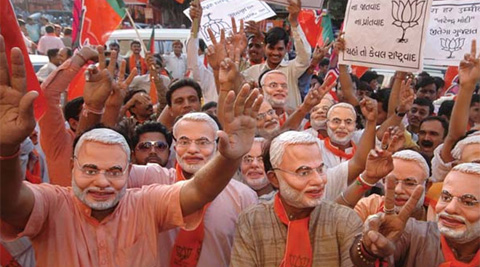Today marks the final phase of India’s election marathon.![]()
Voters in 41 constituencies will elect their members of the Lok Sabha (लोक सभा), the 545-seat lower house of the Indian parliament. After today’s voting, exit polls should give Indians (and the rest of us) the first indications of what the results might be, though they have been vastly wrong in the past. The official final results will be announced on Friday, May 16.
In particular, it’s the biggest day of voting in two of India’s most populous states. Uttar Pradesh will elect 18 of its 80 seats today, and West Bengal will elect 17 of its 42 seats. In addition, Bihar will elect its final six legislators.
In West Bengal, a state of 91 million Indians, chief minister Mamata Banerjee’s local All India Trinamool Congess (TMC, সর্বভারতীয় তৃণমূল কংগ্রেস) is set to win the biggest share of the vote after sweeping to power in the state’s 2011 elections and, in so doing, sweeping a 34-year communist government out of office in West Bengal.
* * * * *
RELATED: Mamata-Modi spat takes center stage in West Bengal
* * * * *
Nonetheless, the Communist Party of India (Marxist) (CP-I(M)) and the Left Front (বাম ফ্রন্ট) are expected to win a large share of the vote as well.
That leaves India’s two national parties, the governing, secular Indian National Congress (Congress, भारतीय राष्ट्रीय कांग्रेस) of Rahul Gandhi and outgoing prime minister Manmohan Singh, and the conservative, Hindu nationalist Bharatiya Janata Party (the BJP, भारतीय जनता पार्टी) of chief minister Narendra Modi, both unlikely to make many gains in West Bengal.
Both Uttar Pradesh and Bihar will provide more fertile territory, especially for the BJP, which needs to win most of the 122 seats in those two states to have a chance at winning a majority government in the Lok Sabha.
In what might be the most watched constituency in India, Modi is battling Arvind Kejriwal, the former chief minister of Delhi, in the city of Varanasi (formerly Benares). Lying on the shores of the Ganges River, the city is known as India’s holiest, and it’s in the heart of Uttar Pradesh.
* * * * *
RELATED: Did Kejriwal err in resigning position as Delhi’s chief minister?
* * * * *
Kejriwal emerged as one of the most popular politicians in the country after his showing in the December 2013 elections in the National Capital territory. His newly formed Aam Aadmi Party (AAP, आम आदमी की पार्टी, Common Man Party) took power for 49 days, instituting popular policies from water and power subsidies to hotlines for reporting bribery. Kejriwal resigned, however, in February, when the territorial legislature refused to enact his jan lokpal bill that would have instituted mechanisms for reducing corruption.
Since leaving office, Kejriwal has led a national campaign for the AAP, hoping that he can recreate the same electoral magic nationally that he did six months ago. But there’s a general sense that Kejriwal made a mistake by resigning, and that his national campaign attempts to do too much in too little time. There’s a chance that it will backfire so much that the AAP might not even win a majority of Delhi’s seats to the Lok Sabha.
But in Varanasi, Kejriwal has waged an electrifying fight against Modi, who chose to contest both the Varanasi constituency and in the Vadodara constituency in his home state of Gujarat.
It’s a seat that’s toggled back and forth between the two parties throughout the past, but the BJP has held it in five of the past six elections. Nearly 50% of the constituency’s population belong to upper castes, while just 13% are dalit and another 25% are ‘Other Backward Castes’ (OBC). Muslims constitute just 14% of the electorate. Sparing too many details of India’s complex caste politics, it means that Modi has a demographic advantage over all challengers, even if most of the city’s Muslims flock to the AAP.
Despite the tenacity of Kejriwal’s campaign, anti-Modi voters could easily split among the AAP, Congress and other regional parties, thereby making it even easier for Modi to win (India’s elections are determined on a first-past-the-post basis). In the final days of the campaign, India’s election commission refused to allow Modi to hold a political rally in Varanasi due to security concerns. Nonetheless, Rahul Gandhi led a campaign event there yesterday, responding to Modi’s harsh broadside against Congress and the Nehru-Gandhi family’s role in Indian politics.
Photo credit to the AP (workers showing support for Modi in Varanasi).
